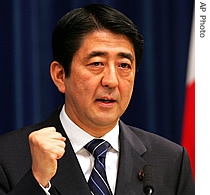2007年VOA标准英语-Japan Prime Minister's Job in Peril in Coming E
搜索关注在线英语听力室公众号:tingroom,领取免费英语资料大礼包。
(单词翻译)
By Catherine MakinoTokyo
26 July 2007
Japan's Prime Minister Shinzo Abe is battling to hold onto power in elections on Sunday for the upper house of parliament. His popularity is at new lows because of political scandals and a perception he is not focusing on the nation's problems. Catherine Makino reports from Tokyo.
 |
| Japanese Prime Minister Shinzo Abe raises a fist as he addresses a press conference (File) |
Public opinion polls indicate the ruling coalition2 could lose control of the upper house of parliament in the vote.
Mr. Abe has been hit by gaffes3 and scandals involving his ministers, which led three of them to resign, and one to commit suicide. One poll shows that only 28 percent of the public approves of his performance.
Some critics say the biggest campaign topic is the government's blunder in losing 50 million pension records - leaving people worried about their retirement4 funds.
Andrew Horvat, a visiting professor of economics at Tokyo Keizai University, says the prime minister's agenda is different from the people's agenda, and that is why the LDP will suffer heavy losses.
Mr. Abe has ignored economic issues and focused on constitutional revision and a more patriotic5 educational system.
"For the man on the street, Japan has been in a recession for 15 years, … but this is also an example of some problems that the present government is not addressing, which is the polarization of incomes," said Horvat. "Ordinary people have not seen an improvement in their lives in about 15 years."
In one poll, 42 percent of voters said they were worse off than they were last year and only seven percent said their situations had improved. Mr. Abe's focus on rewriting the country's 1947 pacifist constitution was at the bottom of voters' lists of priorities for the government.
If the result Sunday is a severe loss, LDP members may choose a new leader, who would become prime minister.
"Abe might have to resign if he loses," he said. "Even if it goes down two or three seats his entire agenda will be discredited6."
A loss, however, will not necessarily force Mr. Abe out of office. The LDP and its coalition partners still control the more powerful lower house of parliament, which approves the prime minister. But it would make it harder to pass legislation, because the opposition7 in the upper house could delay or kill bills.
Mr. Abe's coalition needs to win at least 64 of the 121 seats up for grabs Sunday. The coalition currently maintains control with 132 seats. The upper house of parliament has a total of 242 seats, and half of them are up for election.




